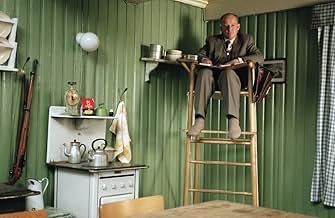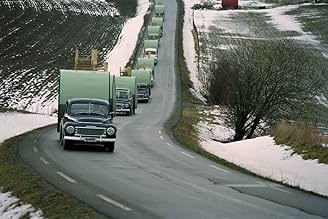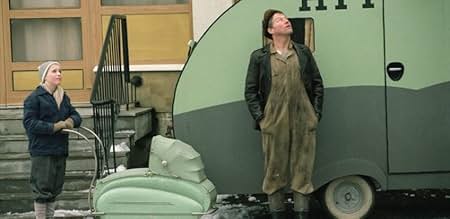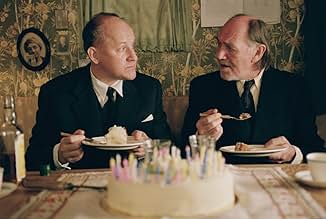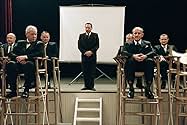IMDb RATING
7.3/10
8.8K
YOUR RATING
A scientific observer's job of observing an old cantankerous single man's kitchen habits is complicated by his growing friendship with him.A scientific observer's job of observing an old cantankerous single man's kitchen habits is complicated by his growing friendship with him.A scientific observer's job of observing an old cantankerous single man's kitchen habits is complicated by his growing friendship with him.
- Awards
- 8 wins & 7 nominations total
Gard B. Eidsvold
- Bakkerman
- (as Gard Eidsvold)
- Director
- Writers
- All cast & crew
- Production, box office & more at IMDbPro
Featured reviews
This movie pokes fun, in a very gentle way, at a whole lot of things. At the Swedes and their "Ikea-type" market research, at the Norwegians and their laconic ways, and at the strange ways of humans altogether. This movie manages to be moving without being sentimental or manipulative. What I mean here is that the element of manipulation that is quite obvious in many of the more sophisticated recent "feel good" movies I generally enjoy (you know the ones I mean - Cinema Paradiso, Billy Elliot etc.) is not in evidence here. We are getting at something pretty basic and human with "Kitchen Stories". The movie tracks the unlikely relationship that develops between the Swedish market researcher, sent to observe (and strictly forbidden to interact with the subject of his study) the kitchen ways of his crusty Norwegian bachelor "host". Sounds rather minimal but this is a movie that is as good as a movie can get. Perfect pacing, perfect acting, perfect camera work, perfect story. While the movie can be enjoyed on the tv, as video, I think that it is best seen on a larger screen in a movie theater because the visual impact is strong. You come out of this movie a happier person than went in and that is worth something these days !
When I picked up this DVD, I noticed two prominent words on the front--"Hilarious" and "Funny". After seeing the film, I think these are both completely inappropriate descriptions of the film. So, of course, some advertising idiots decided to promote this as a hilarious comedy, even though this did not appear to be the intention of those who made the movie! There are a few mildly funny moments, but it just isn't a comedy. Instead, it's a slight slice of life film about a Swedish company that prides itself on scientifically investigating EVERYTHING there is about kitchens. The story centers on one of their studies which is done with Norwegian bachelors. They decided to send observers into these kitchens and passively watch and record the movement patterns of these men. The observers and observed are under strict orders NOT to interact in any way.
This story centers on one home. At first, the bachelor doesn't want to even allow the observer in the home. Then, once he begrudgingly lets him in, their relationship is pretty tense. However, over time it is natural that a bond is created between them. The acting is good and the story generally pretty compelling. Not a bad little unusual film, but for some reason the writers decided to end the movie on a down note--I can understand the choice, but don't agree with it at all.
This story centers on one home. At first, the bachelor doesn't want to even allow the observer in the home. Then, once he begrudgingly lets him in, their relationship is pretty tense. However, over time it is natural that a bond is created between them. The acting is good and the story generally pretty compelling. Not a bad little unusual film, but for some reason the writers decided to end the movie on a down note--I can understand the choice, but don't agree with it at all.
This film was a surprise since we went without any preconceptions, having avoided reading about it beforehand. It is a droll attempt at film making by Bent Hamer, the director, who collaborated on the scenario.
The film presents a story that on its surface seems to be one thing, but deep inside there is an ode to friendship between two different, but stoic Scandinavian men, Isak and Folke, whose lives become entwined as they discover how they are similar, despite of all appearances. The story is set in the bleak and snowy Norwegian winter.
In the end, Folke is a better man by having known Isak, the man who he doesn't understand at the beginning of the story, but who unknown to him, was always looking over him, without the other one knowing it.
The three principals are very well portrayed. This film will resonate with people that find themselves alone at the last stages of their lives, and how they are changed by opening up to perfect strangers who are going through the same thing themselves.
The film presents a story that on its surface seems to be one thing, but deep inside there is an ode to friendship between two different, but stoic Scandinavian men, Isak and Folke, whose lives become entwined as they discover how they are similar, despite of all appearances. The story is set in the bleak and snowy Norwegian winter.
In the end, Folke is a better man by having known Isak, the man who he doesn't understand at the beginning of the story, but who unknown to him, was always looking over him, without the other one knowing it.
The three principals are very well portrayed. This film will resonate with people that find themselves alone at the last stages of their lives, and how they are changed by opening up to perfect strangers who are going through the same thing themselves.
The title may not be alluring. In fact, "Kitchen Stories" could be misleading to some that it'd be more of a women movie. Far from it - though it all may have started with the 'dazzling' multi-tetrahedrons of a chart that the self-satisfied scientist boasts of demonstrating findings on women's activity traffic in a kitchen. The snappy music sets me quite at ease in spite of anticipating reading subtitles - the melodic and light drum beats, chorus behind main vocal, sax/trumpet/trombone sounds - it's easy swinging tunes, indeed. The official site from filmsdulosange.fr gives you a feel of the 50's and a sampling of the jingle-like jazzy tune.
"Kitchen Stories" is an absolutely delightful piece. It's about a meticulously organized scientific research in the '50's on studying the kitchen behavior of single Norwegian men by assigned researchers from Sweden, in the name of advancement, of course - to improve kitchen activity efficiency. Sounds awfully dry? How can watching two men watching each other be interesting? Ah, to the genius of director Bent Hamer, who co-wrote and co-produced with Jörgen Bergmark, the film is simple enjoyment and relaxing fun. It's the discerning humor of observing human behavior of all parties involved: neighbor and neighborhood doctor, researcher and target subject, boss man and his boss - it's a film to relish and bemused upon.
Having had graphic arts, any pattern catches my eye. The opening scene - the caravan of the nine trailers each with an interesting form seen at the top of the trailer presented quite an engaging sight. Towards the end, one would realize - ah, it's that indispensable high umpire chair! Truly a well-made film and down to earth charming in all its naturalness - yes, engaging even with all the 'silent,' 'quiet,' 'observing' scenes - within and without the house.
It's also intriguing: what's happening elsewhere/upstairs while Folke Nilsson sat so quietly alone in the dark in that kitchen observation station of Isak's; what's Isak's thinking while he's piping; Grant the neighbor, what's he up to watching without a word in the cold darkness. And in the name of science, we are given insights to the 'body electric' static radio tuning.what am I talking about? Ha, that's another smilingly amusing reason to enjoy "Kitchen Stories." Thanks to the subtitles by Nick Norris, we get steady doses of chuckle and bemusing smiles throughout the film. The two main leads, Joachim Calmeyer as Isak and Tomas Norström as Folke, are fantastically 'wry' in their own self-bemused way, complementing each other's performance.
Not everything's indoors per se, there are impressive snowy landscapes, light of dawn and dead of night scenes by cinematographer Philip Øgaard. There's also a touching side story revolves around a faithful companion of a horse, and an anticipated red horse. It's full of little sprinkles of surprises and details, down to the specific food that Folke likes. Do enjoy this film. Bemused is the word repeatedly reinforced.
"Kitchen Stories" is an absolutely delightful piece. It's about a meticulously organized scientific research in the '50's on studying the kitchen behavior of single Norwegian men by assigned researchers from Sweden, in the name of advancement, of course - to improve kitchen activity efficiency. Sounds awfully dry? How can watching two men watching each other be interesting? Ah, to the genius of director Bent Hamer, who co-wrote and co-produced with Jörgen Bergmark, the film is simple enjoyment and relaxing fun. It's the discerning humor of observing human behavior of all parties involved: neighbor and neighborhood doctor, researcher and target subject, boss man and his boss - it's a film to relish and bemused upon.
Having had graphic arts, any pattern catches my eye. The opening scene - the caravan of the nine trailers each with an interesting form seen at the top of the trailer presented quite an engaging sight. Towards the end, one would realize - ah, it's that indispensable high umpire chair! Truly a well-made film and down to earth charming in all its naturalness - yes, engaging even with all the 'silent,' 'quiet,' 'observing' scenes - within and without the house.
It's also intriguing: what's happening elsewhere/upstairs while Folke Nilsson sat so quietly alone in the dark in that kitchen observation station of Isak's; what's Isak's thinking while he's piping; Grant the neighbor, what's he up to watching without a word in the cold darkness. And in the name of science, we are given insights to the 'body electric' static radio tuning.what am I talking about? Ha, that's another smilingly amusing reason to enjoy "Kitchen Stories." Thanks to the subtitles by Nick Norris, we get steady doses of chuckle and bemusing smiles throughout the film. The two main leads, Joachim Calmeyer as Isak and Tomas Norström as Folke, are fantastically 'wry' in their own self-bemused way, complementing each other's performance.
Not everything's indoors per se, there are impressive snowy landscapes, light of dawn and dead of night scenes by cinematographer Philip Øgaard. There's also a touching side story revolves around a faithful companion of a horse, and an anticipated red horse. It's full of little sprinkles of surprises and details, down to the specific food that Folke likes. Do enjoy this film. Bemused is the word repeatedly reinforced.
Having just seen Kaurismaki's dryly-witty `Man Without a Past,' I couldn't believe that director Bent Hamer's `Kitchen Stories' is actually drier and funnier. The Norse/Swedish co-production depicts 1950's Swedes studying bachelors in their kitchens to improve their lives. Swedish scientist Folke, in a high chair like some infantile god, observes Norwegian Isak under the restriction that he must not interact with Isak.
The humor comes from the stereotypical Swede as uptight and organized and the Norwegian as slow but solid. The silliness of the experiment itself is obvious and the restriction ludicrous because of course they will interact, in fact bond, given the loneliness of Norway's winter and the need for humans to be sociable. That the story turns on male bonding is a bonus, especially because neither country is considered a bastion of sociability. When Isak lets Folke listen to the radio on his teeth fillings, I figure the guys are in for some warm nights.
In another way, this film could be as good as it gets for analyzing the effect observers have on their subjects, be it laboratory or media. A question probably unanswerable even today is how much anyone changes under observation. In the case of the central characters in `Kitchen Stories,' the change is considerable, but more so just because of another human being's presence in an otherwise lonely world. The credibility of documentaries and scientists is on the table here.
The minimal dialogue and occasional joke, spiced with subtle racial stereotyping, makes me think of not only Kaurismaki but also Beckett, whose waiting characters sometime talk nonsense, but most of the time profundity under the guise of simplicity. `Kitchen' is a slow but rewarding film that strips life of its pretensions to study more closely the tissue that binds humanity with communication.
Diplomat Dag Hammarskjold in his Markings caught the minimalism of this film: `Friendship needs no words-it is solitude delivered from the anguish of loneliness.'
The humor comes from the stereotypical Swede as uptight and organized and the Norwegian as slow but solid. The silliness of the experiment itself is obvious and the restriction ludicrous because of course they will interact, in fact bond, given the loneliness of Norway's winter and the need for humans to be sociable. That the story turns on male bonding is a bonus, especially because neither country is considered a bastion of sociability. When Isak lets Folke listen to the radio on his teeth fillings, I figure the guys are in for some warm nights.
In another way, this film could be as good as it gets for analyzing the effect observers have on their subjects, be it laboratory or media. A question probably unanswerable even today is how much anyone changes under observation. In the case of the central characters in `Kitchen Stories,' the change is considerable, but more so just because of another human being's presence in an otherwise lonely world. The credibility of documentaries and scientists is on the table here.
The minimal dialogue and occasional joke, spiced with subtle racial stereotyping, makes me think of not only Kaurismaki but also Beckett, whose waiting characters sometime talk nonsense, but most of the time profundity under the guise of simplicity. `Kitchen' is a slow but rewarding film that strips life of its pretensions to study more closely the tissue that binds humanity with communication.
Diplomat Dag Hammarskjold in his Markings caught the minimalism of this film: `Friendship needs no words-it is solitude delivered from the anguish of loneliness.'
Did you know
- TriviaAt the beginning of the film, Malmberg (a Swede) becomes ill after having to drive on the right side of the road in Norway. Today both countries drive on the right. In 1967, Sweden switched to the right because making two versions of cars like Volvos and Saabs for domestic and foreign sales was inefficient. Also, there are many unguarded, unmarked border crossings points (unlike the crossing in the film); people would not realize which country they were in and sometimes ended up driving on the wrong side.
- SoundtracksVisa Från Utanmyra
Performed by Jan Johansson
- How long is Kitchen Stories?Powered by Alexa
Details
- Release date
- Countries of origin
- Languages
- Also known as
- Kitchen Stories
- Production companies
- See more company credits at IMDbPro
Box office
- Gross US & Canada
- $351,235
- Opening weekend US & Canada
- $48,103
- Feb 22, 2004
- Gross worldwide
- $2,823,472
- Runtime
- 1h 35m(95 min)
- Color
- Sound mix
- Aspect ratio
- 1.85 : 1
Contribute to this page
Suggest an edit or add missing content


